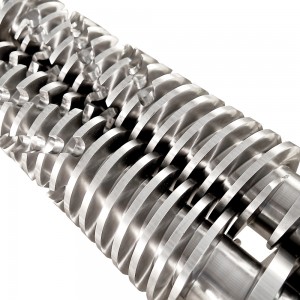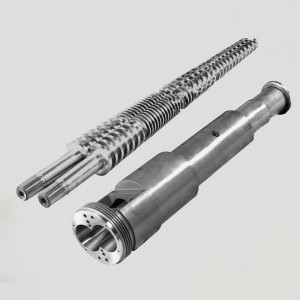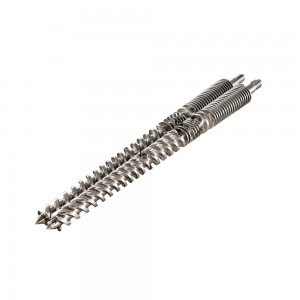
Manufacturers face persistent challenges in PVC pipe production, including material consistency and energy efficiency. The PVC Pipe and Profile Designed for Extruders Conical Twin Screw Barrel offers a transformative solution. Its innovative design optimizes material mixing and thermal regulation. As a core component of the Plastic Twin Screw Extruder, it enhances output quality while reducing operational costs. Leading innovations from an Extruder Twin Screw & Barrel Factory ensure this technology meets the rigorous demands of modern production environments.
Common Challenges in PVC Pipe Extrusion
Temperature Control Issues
Temperature control plays a critical role in PVC pipe extrusion. Inconsistent temperature settings often lead to material degradation, causing defects in the final product. Excessive heat can result in the decomposition of PVC, while insufficient heat prevents proper melting. Manufacturers frequently encounter precipitation problems due to improper temperature regulation and pressure fluctuations. These issues not only affect product quality but also increase production downtime. Effective temperature management ensures consistent material flow and prevents defects such as discoloration or structural weaknesses.
Material Stability and Homogeneity
Achieving material stability and homogeneity is essential for producing high-quality PVC pipes. Variations in material composition during processing can lead to color differences and uneven product surfaces. Stabilizers and additives must be evenly distributed to maintain consistency. However, challenges such as the pasty phenomenon arise when material stability is compromised. This issue often stems from high screw speeds, poor material mixing, or suboptimal mold designs. Advanced equipment like the PVC Pipe and Profile Designed for Extruders Conical Twin Screw Barrel addresses these challenges by ensuring thorough material blending and stability.
Limitations in Extrusion Speed and Efficiency
Extrusion speed directly impacts production efficiency. However, increasing speed without proper equipment can lead to defects such as uneven wall thickness or surface imperfections. High speeds may also exacerbate temperature control issues and material instability. Mold design and screw configuration play a significant role in overcoming these limitations. Modern solutions, including conical twin screw barrels, enhance extrusion speed while maintaining product quality. These innovations reduce energy consumption and improve overall operational efficiency, making them indispensable for manufacturers.
PVC Pipe and Profile Designed for Extruders Conical Twin Screw Barrel

Key Design Features and Advantages
The PVC Pipe and Profile Designed for Extruders Conical Twin Screw Barrel incorporates advanced engineering to address common extrusion challenges. Its conical design optimizes material flow, ensuring consistent mixing and stability during the extrusion process. The intermeshing screws create a larger surface area in the plasticizing section, allowing for controlled energy input. This design minimizes material degradation and die swell, resulting in higher-quality PVC pipes and profiles.
The barrel’s temperature regulation system plays a pivotal role in maintaining product integrity. By controlling the plasticizing rate through temperature rather than shear, it reduces the risk of material decomposition. This feature ensures uniform melting and prevents defects such as discoloration or uneven surfaces. Additionally, the streamlined structure enhances energy efficiency, lowering amperage requirements and improving power economy at higher RPMs.
Durability is another hallmark of this design. The use of high-quality alloy steel and wear-resistant materials extends the barrel’s lifespan, reducing maintenance costs. An anti-corrosion coating protects components from damage caused by corrosive materials, further enhancing reliability. Manufacturers benefit from these features through reduced downtime and consistent production output.
How They Differ from Traditional Screw Barrels
Conical twin screw barrels differ significantly from traditional screw barrels in both design and functionality. Traditional barrels often rely on shear forces for plasticizing, which can lead to uneven energy distribution and material degradation. In contrast, conical twin screw barrels utilize a temperature-controlled plasticizing rate, ensuring precise energy input and reducing unwanted heat generation.
The intermeshing screw design sets conical barrels apart. While traditional barrels feature uniform screw surfaces, conical barrels offer a larger surface area in the plasticizing section and a smaller surface in the metering section. This configuration enhances material mixing and stability while minimizing energy waste. The result is a more efficient extrusion process with improved product quality.
Energy efficiency is another key differentiator. Conical twin screw barrels consume less energy due to their optimized design, reducing production costs and aligning with modern environmental standards. Their ability to operate at higher RPMs without compromising quality makes them a preferred choice for manufacturers seeking to boost productivity.
Tip: Manufacturers looking to upgrade their extrusion systems should consider the long-term benefits of conical twin screw barrels. Their advanced features not only improve product quality but also reduce operational costs and energy consumption.
Addressing Extrusion Challenges with Conical Twin Screw Barrels

Enhanced Temperature Regulation for Consistent Quality
Temperature regulation is a critical factor in PVC pipe extrusion. The Conical Twin Screw Barrel ensures precise control over heat distribution, preventing material degradation and ensuring consistent melting. Its advanced temperature control system minimizes the risk of overheating, which can lead to discoloration or decomposition of PVC. By maintaining optimal thermal conditions, the barrel guarantees uniform material flow and enhances the structural integrity of the final product.
Manufacturers benefit from this feature by reducing production downtime caused by temperature-related defects. The barrel’s design also eliminates the need for frequent adjustments, streamlining operations and improving overall efficiency. This innovation addresses one of the most persistent challenges in extrusion, enabling manufacturers to produce high-quality PVC pipes with minimal waste.
Note: Proper temperature regulation not only improves product quality but also extends the lifespan of extrusion equipment by reducing thermal stress.
Improved Material Mixing and Stability
Achieving material homogeneity is essential for producing flawless PVC pipes. The Conical Twin Screw Barrel excels in this area by utilizing intermeshing screws that enhance material blending. This design ensures that stabilizers, additives, and base materials are evenly distributed throughout the extrusion process. The result is a consistent product with smooth surfaces and uniform color.
The barrel’s streamlined structure reduces the occurrence of the pasty phenomenon, a common issue caused by poor mixing or high screw speeds. By optimizing the mixing process, the barrel prevents defects such as uneven wall thickness or surface imperfections. Manufacturers gain the ability to produce pipes and profiles that meet stringent quality standards, even at higher production speeds.
- Advantages of Improved Mixing:
- Uniform distribution of additives.
- Enhanced product stability.
- Reduced material waste.
Boosting Production Speed and Reducing Energy Consumption
The Conical Twin Screw Barrel significantly enhances production speed without compromising quality. Its innovative design allows manufacturers to operate at higher RPMs while maintaining precise control over material flow and temperature. This capability increases output rates, enabling manufacturers to meet growing demand efficiently.
Energy conservation is another standout feature. The barrel reduces energy consumption by up to 30% compared to traditional single-screw extruders. This reduction not only lowers operational costs but also aligns with modern environmental standards. The barrel’s ability to optimize energy usage makes it an ideal choice for manufacturers seeking sustainable solutions.
Tip: Investing in energy-efficient equipment like the Conical Twin Screw Barrel can lead to long-term savings and improved profitability.
Practical Implementation of Conical Twin Screw Barrels
Selecting the Right Barrel for Your Production Needs
Choosing the appropriate barrel for PVC production requires careful evaluation of specific criteria. Manufacturers should consider the following factors:
- Molecular weight of the material to ensure compatibility.
- Packing of primary particles to achieve uniformity.
- Packing of grains for consistent extrusion.
- Thermal stability to prevent material degradation.
Comparing performance metrics between co-rotating and counter-rotating twin screw extruders can also guide decision-making:
| Parameter | Co-Rotating Twin Screw Extruder | Counter-Rotating Twin Screw Extruder |
|---|---|---|
| Conversion Rates | Higher under certain conditions | Lower under similar conditions |
| Mixing Efficiency | Enhanced with proper segments | Less efficient |
| Temperature Profile | More uniform | Variable |
| Screw Speed | Higher flexibility | Limited flexibility |
| Throughput | Generally higher | Generally lower |
Selecting the right barrel ensures optimal performance and enhances the quality of PVC products, including those produced using the PVC Pipe and Profile Designed for Extruders Conical Twin Screw Barrel.
Maintenance and Longevity Tips
Proper maintenance extends the lifespan of conical twin screw barrels. Regular inspections help identify wear and tear early. Cleaning the barrel after each production cycle prevents material buildup. Using high-quality lubricants reduces friction and minimizes wear. Additionally, replacing worn components promptly avoids further damage. These practices ensure consistent performance and reduce downtime.
Training and Operational Best Practices
Training operators on equipment handling and process optimization improves production efficiency. Skilled operators can adjust process parameters to maintain quality. Studies show that upgrading operator skills reduces defective rates by 15%. Implementing best practices, such as monitoring equipment aging and optimizing process parameters, can increase extrusion volume by 50%. Manufacturers benefit from enhanced productivity and reduced operational costs.
Conical twin screw barrels revolutionize PVC pipe production by ensuring uniform melt distribution, enhancing cooling efficiency, and achieving dimensional stability. These features improve product quality and operational speed while reducing energy consumption.
| Benefit | Description |
|---|---|
| Uniform Melt Distribution | Ensures consistent quality in the extrusion process. |
| Cooling Efficiency | Enhances the production speed and quality by maintaining optimal temperatures. |
| Dimensional Stability | Allows for the production of high-quality products with tight tolerances. |
Manufacturers gain long-term advantages by adopting this technology, including reduced costs and improved productivity.
Tip: Investing in conical twin screw barrels ensures sustainable growth and competitive edge in the industry.
FAQ
What makes conical twin screw barrels more efficient than traditional barrels?
Conical twin screw barrels optimize material mixing and temperature control. Their intermeshing screw design ensures uniform energy distribution, reducing material degradation and improving extrusion efficiency.
How does the Conical Twin Screw Barrel reduce energy consumption?
The barrel’s streamlined design minimizes energy waste. It operates at higher RPMs with lower power requirements, reducing energy consumption by up to 30% compared to traditional extruders.
Can conical twin screw barrels handle different materials besides PVC?
Yes, they can process various materials, including PE and other thermoplastics. Configuring different molds and auxiliary machines enables the production of diverse shapes and sizes.
Tip: Consult with JT MACHINE experts to determine the best configuration for your specific production needs.
Post time: May-15-2025
